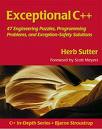Olivier Langlois's blog
Exceptional C++: 47 Engineering Puzzles, Programming Problems, and Solutions
07/30/07
Exceptional C++: 47 Engineering Puzzles, Programming Problems, and Solutions
This book presents advices more or less in the same format than books from the Effective C++ serie. What is similar is that topics are divided in 47 small items of few pages each. The difference is that the author first ask questions to the readers or propose exercises and encourage the reader to put down the book and to take the time to think about the problem and then come back to read his answer. This format is more or less original as I have seen something similar in Tom Cargill's C++ Programming Style book.
I have read this book pretty fast which is a good sign of my interest in a book but in the same time this book did not leave me, at first, a strong impression that will make me remember this reading for a long time. It is hard for me to say exactly why but I think that it is because most items focus on very small details of C++. Some of these problems are very hard and probably is an indication that the book targeted audience is advanced C++ users which is not a bad thing by itself but I was not convinced that mastering these small details actually has a high impact on someone programming skills.
It took few months to let the wisdom contained in this book to sink in and I have found myself many times, in my day to day programming, confronted to problems where the material of this book helped to make wise design decisions. So now, I think that this book is very valuable for anyone that has mastered the C++ programming language and is ready to master tougher C++ issues.
Comments, Pingbacks:
No Comments/Pingbacks for this post yet...
Comments are closed for this post.
Olivier Langlois's blog
I want you to find in this blog informations about C++ programming that I had a hard time to find in the first place on the web.
| Sun | Mon | Tue | Wed | Thu | Fri | Sat |
|---|---|---|---|---|---|---|
| << < | > >> | |||||
| 1 | 2 | 3 | 4 | 5 | 6 | 7 |
| 8 | 9 | 10 | 11 | 12 | 13 | 14 |
| 15 | 16 | 17 | 18 | 19 | 20 | 21 |
| 22 | 23 | 24 | 25 | 26 | 27 | 28 |
Search

Categories
Olivier Langlois's blog
- AAC (2)
- Book reviews (12)
- C++ (24)
- Code Optimization (4)
- Compiler (3)
- Fractal (2)
- Linux/UNIX (3)
- Multithreading (3)
- Software security (7)
- TCP/IP (8)
- Web (1)
- Windows programming (19)
- C++ (28)
- tutorials (4)
- General (10)
- Hardware reviews (2)
- Linux (12)
- Recommended books (4)
- C++ (20)
- Code Optimization (2)
- Compiler (3)
- Fractal (2)
- Linux/UNIX (1)
- Multithreading (2)
- Rare out of print (3)
- Software security (5)
- TCP/IP (7)
- Windows programming (16)
- Software reviews (0)
- TCP/IP (8)
- Video games (4)
Archives
- January 2016 (1)
- September 2015 (1)
- July 2015 (1)
- June 2015 (1)
- May 2015 (1)
- December 2013 (3)
- September 2013 (1)
- May 2013 (8)
- April 2013 (1)
- December 2010 (1)
- August 2010 (1)
- June 2010 (1)
- More...
Misc
 XML Feeds
XML Feeds
What is RSS?
Who's Online?
- Guest Users: 8
 BOOKS i'm reading
BOOKS i'm reading




